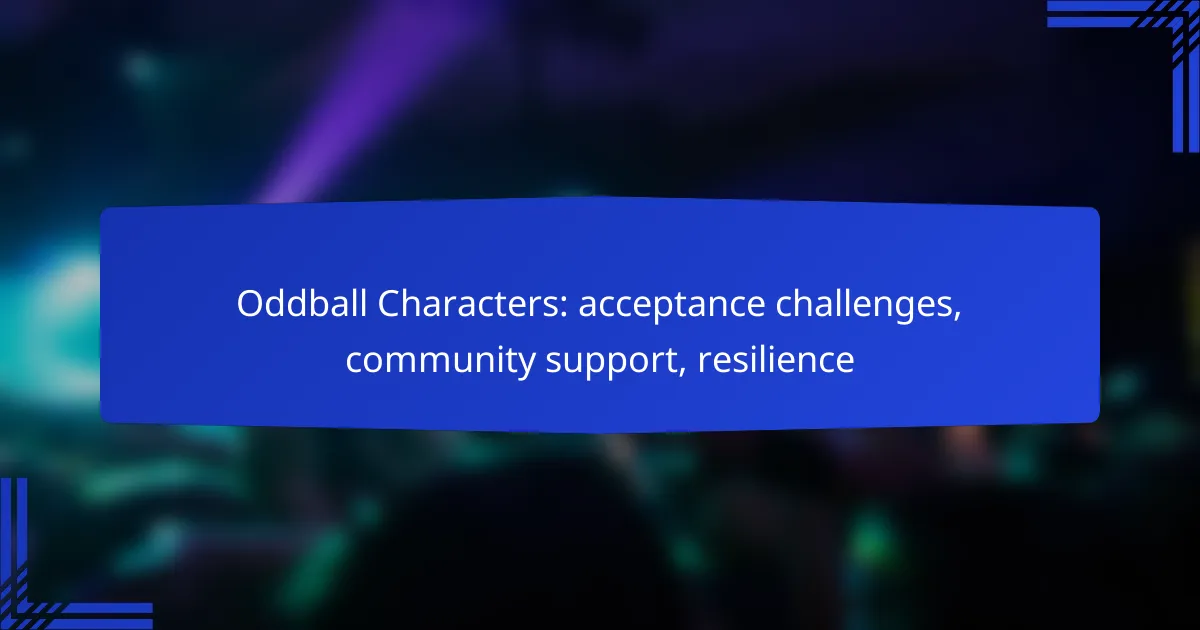In a world that often values conformity, oddball characters face unique challenges in seeking acceptance and belonging. However, community initiatives in Canada play a vital role in promoting inclusivity and understanding, offering support through advocacy organizations and peer mentorship. By embracing resilience strategies such as mindfulness and creative expression, these individuals can navigate their journeys with confidence and foster meaningful connections within their communities.

How can oddball characters find acceptance in Canada?
Oddball characters in Canada can find acceptance through community initiatives that promote inclusivity and understanding. By engaging with supportive networks and participating in local events, individuals can foster connections that celebrate diversity.
Community outreach programs
Community outreach programs in Canada aim to bridge gaps between diverse groups and promote acceptance of oddball characters. These programs often include workshops, educational sessions, and social activities designed to raise awareness and reduce stigma.
For example, local organizations may host events that encourage dialogue about uniqueness and individuality. Participation in these programs can help oddball characters feel valued and understood within their communities.
Support groups for diverse individuals
Support groups specifically for diverse individuals provide a safe space for oddball characters to share experiences and challenges. These groups often focus on building resilience and fostering a sense of belonging among members.
In Canada, many support groups are facilitated by trained professionals and offer resources tailored to the needs of participants. Engaging with these groups can empower individuals to embrace their uniqueness and connect with others facing similar challenges.
Inclusive events and festivals
Inclusive events and festivals in Canada celebrate diversity and provide platforms for oddball characters to express themselves. These gatherings often feature art, music, and performances that highlight the richness of different cultures and identities.
Examples include pride parades, multicultural festivals, and art shows that welcome all forms of expression. Attending or participating in these events can help oddball characters feel accepted and appreciated within the broader community.
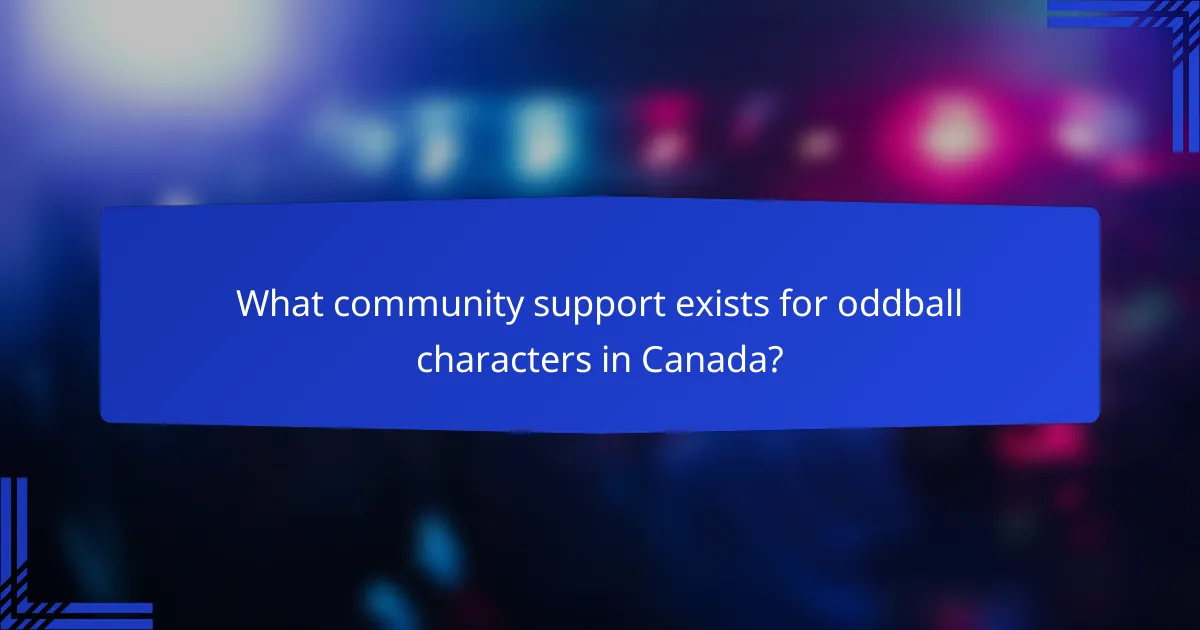
What community support exists for oddball characters in Canada?
In Canada, various forms of community support are available for oddball characters, focusing on acceptance and resilience. These resources include local advocacy organizations, online support networks, and peer mentorship initiatives that foster a sense of belonging and empowerment.
Local advocacy organizations
Local advocacy organizations play a crucial role in supporting oddball characters by promoting acceptance and inclusivity. These groups often host events, workshops, and awareness campaigns aimed at reducing stigma and encouraging community engagement.
Examples of such organizations include the Canadian Mental Health Association and local [censured] centers, which provide resources and safe spaces for individuals to connect and share their experiences. They often collaborate with schools and businesses to create more inclusive environments.
Online support networks
Online support networks offer a platform for oddball characters to connect with others facing similar challenges, regardless of geographic location. These networks can include forums, social media groups, and dedicated websites that focus on sharing stories, advice, and resources.
Popular platforms like Reddit and Facebook host groups specifically for individuals seeking support and understanding. These communities can be particularly valuable for those who may feel isolated in their local environments, providing a sense of belonging and shared experience.
Peer mentorship initiatives
Peer mentorship initiatives connect oddball characters with mentors who have navigated similar challenges, fostering resilience and personal growth. These programs often pair individuals based on shared interests or experiences, allowing for meaningful connections and guidance.
Organizations like Big Brothers Big Sisters Canada offer structured mentorship opportunities, while informal mentorship can occur through community events and online platforms. Engaging in these initiatives can help individuals build confidence and develop coping strategies in a supportive environment.
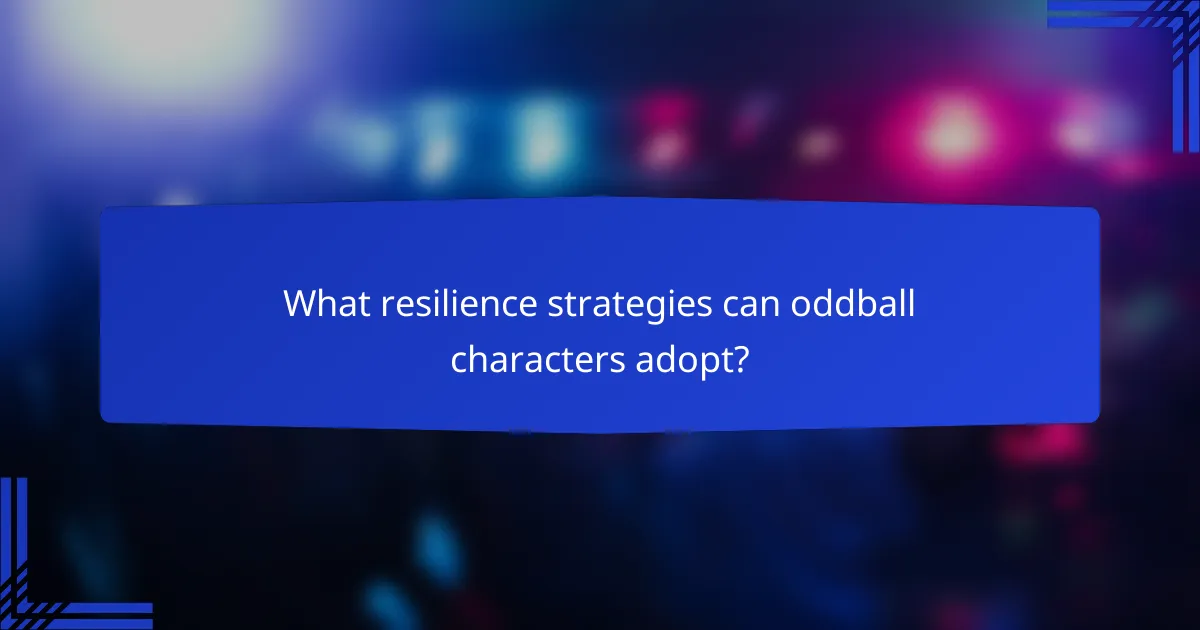
What resilience strategies can oddball characters adopt?
Oddball characters can adopt various resilience strategies to navigate their unique challenges, focusing on self-esteem, mindfulness, and creative expression. These approaches help them build a strong foundation to cope with adversity and foster a sense of belonging within their communities.
Building self-esteem
Building self-esteem is crucial for oddball characters as it enhances their confidence and self-worth. They can start by acknowledging their strengths and accomplishments, no matter how small, and practicing positive self-talk to counter negative thoughts.
Setting achievable goals can also boost self-esteem. For instance, they might aim to learn a new skill or engage in social activities that align with their interests. Celebrating these milestones reinforces a positive self-image.
Practicing mindfulness techniques
Mindfulness techniques can help oddball characters manage stress and anxiety, promoting emotional resilience. Simple practices like deep breathing, meditation, or yoga can ground them in the present moment, reducing feelings of overwhelm.
Incorporating mindfulness into daily routines can be beneficial. For example, dedicating a few minutes each day to mindful walking or journaling can enhance self-awareness and emotional regulation, making it easier to navigate social interactions.
Engaging in creative expression
Creative expression serves as a powerful outlet for oddball characters to process their emotions and experiences. Whether through writing, art, music, or dance, these activities allow them to communicate their feelings and connect with others who share similar interests.
Joining local art groups or online communities can provide additional support and encouragement. Participating in workshops or collaborative projects can foster a sense of belonging, helping them to feel less isolated and more accepted.
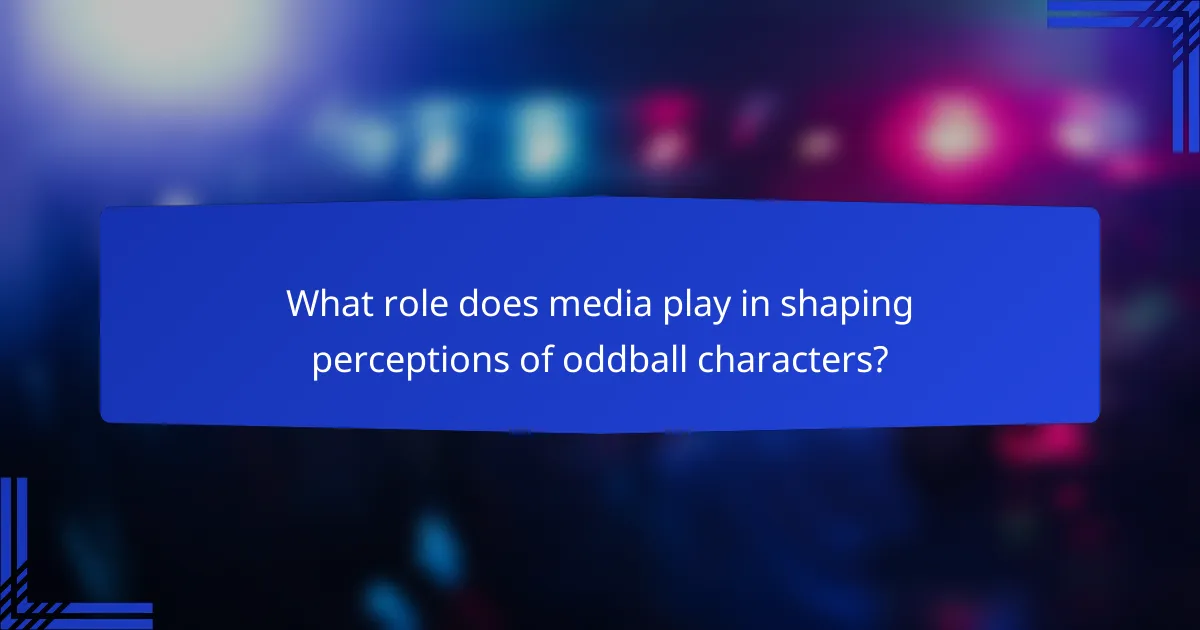
What role does media play in shaping perceptions of oddball characters?
Media significantly influences how society perceives oddball characters by portraying them in various lights, either reinforcing stereotypes or promoting acceptance. Through storytelling, media can foster empathy and understanding, encouraging communities to embrace diversity.
Representation in Canadian television
Canadian television has made strides in representing oddball characters, often highlighting their unique traits and challenges. Shows like “Schitt’s Creek” and “Kim’s Convenience” feature characters that defy conventional norms, showcasing their resilience and the support they receive from their communities.
This representation helps normalize diversity, allowing viewers to see oddball characters as relatable rather than alien. As a result, audiences are more likely to engage with and support individuals who may not fit traditional molds.
Influence of social media platforms
Social media platforms play a crucial role in shaping perceptions of oddball characters by providing a space for dialogue and community building. Platforms like Twitter and Instagram allow individuals to share their stories, fostering connections among those who identify as different.
These platforms can amplify voices that challenge stereotypes, creating movements that advocate for acceptance and understanding. However, it’s essential to navigate these spaces carefully, as negative comments can also emerge, highlighting the need for supportive online communities.
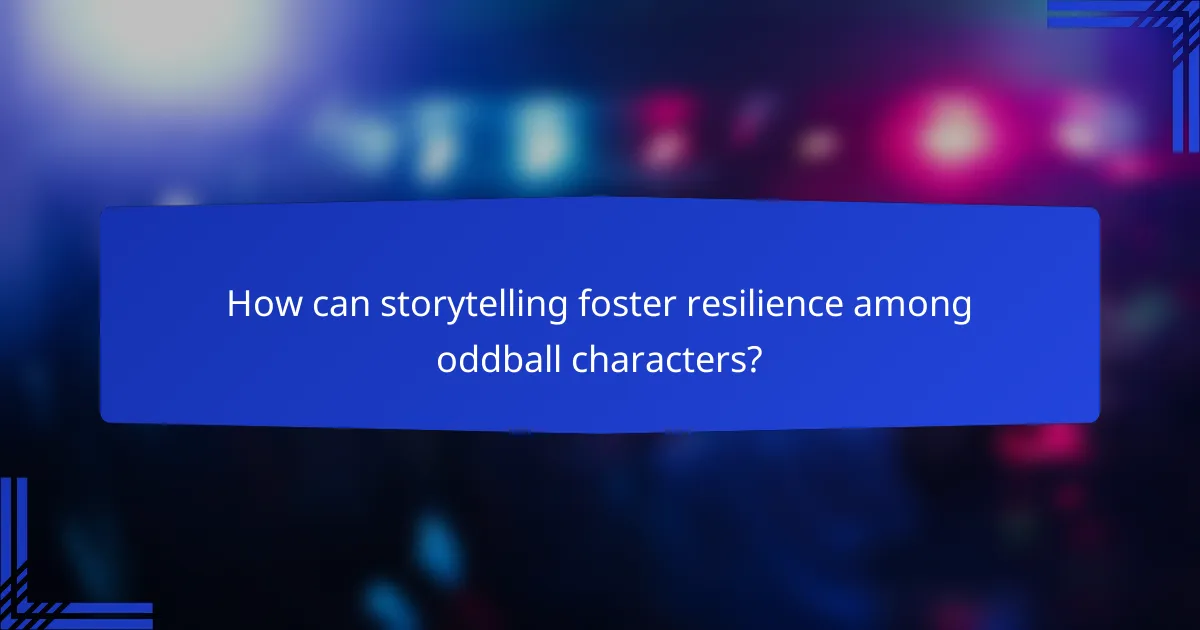
How can storytelling foster resilience among oddball characters?
Storytelling can significantly enhance resilience among oddball characters by providing a platform for expression and connection. Through sharing experiences, these individuals can find common ground, build support networks, and develop coping strategies that reinforce their sense of belonging.
Sharing personal narratives
Sharing personal narratives allows oddball characters to articulate their unique experiences and challenges. This process not only validates their feelings but also encourages others to empathize and relate. For instance, a character who feels isolated due to their interests may find solace in recounting their journey, ultimately fostering a sense of community.
When sharing stories, consider focusing on key moments that highlight resilience, such as overcoming adversity or finding acceptance. This can be done through various mediums, including blogs, social media, or local storytelling events, where individuals can connect with like-minded peers.
Community storytelling events
Community storytelling events create safe spaces for oddball characters to share their experiences collectively. These gatherings can take many forms, such as open mic nights, workshops, or themed storytelling sessions, and they often encourage participation from diverse voices. Engaging in these events can help participants feel less alone and more supported.
To maximize impact, organizers should consider incorporating elements that promote inclusivity, such as providing resources for those who may be hesitant to share. Additionally, creating a welcoming atmosphere can enhance the overall experience, making it easier for individuals to open up and connect with others in their community.
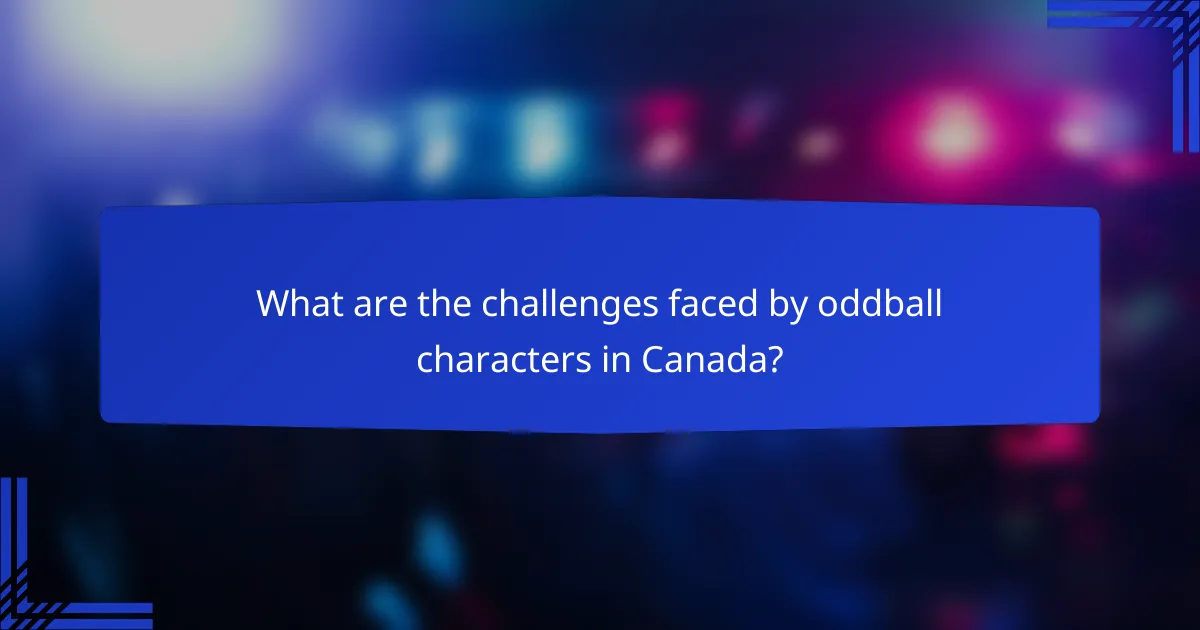
What are the challenges faced by oddball characters in Canada?
Oddball characters in Canada often encounter significant challenges, including social stigma, discrimination, and difficulties in finding supportive communities. These obstacles can hinder their ability to connect with others and fully participate in society.
Social stigma and discrimination
Social stigma and discrimination are prevalent issues for oddball characters in Canada, often manifesting in negative stereotypes and exclusion from mainstream social circles. This stigma can lead to feelings of isolation and low self-esteem, making it difficult for individuals to express their true selves.
Examples of discrimination may include bullying in schools, workplace biases, or exclusion from community events. These experiences can discourage oddball characters from engaging with others, further entrenching their sense of alienation.
To combat social stigma, it is essential for communities to foster inclusivity and acceptance. Initiatives such as awareness campaigns, support groups, and educational programs can help challenge stereotypes and promote understanding. Encouraging open dialogue about diversity can also create a more supportive environment for oddball characters.
